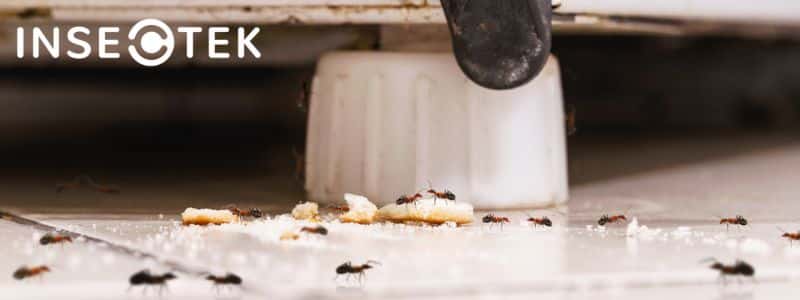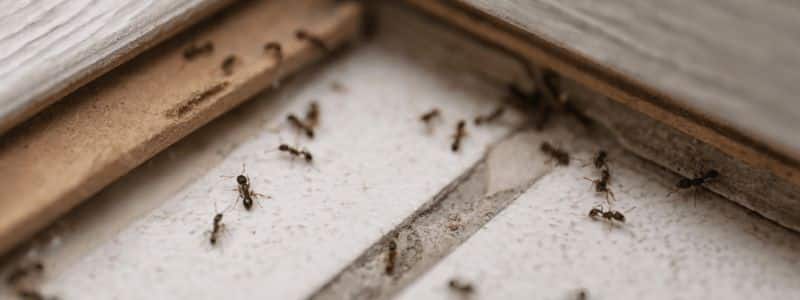Having your home invaded by ants is a scene too familiar to homeowners here in the dry Arizona climate. They swarm across your walls, floors, and counters, looking for your water and food, and have no plans to leave anytime soon. Luckily, there’s always a solution to a pest problem.
In this blog, we’ll look at the following:
- What attracts ants?
- Where to look for ants indoors
- Get rid of ants indoors
- Where to look for ants outdoors
- Get rid of ants outdoors
- Six ways to protect yourself from ants in Arizona
How to Get Rid of Ants Inside and Outside: A Guide
Ants can cause problems just as much outside as they do inside your home. Fortunately, many of these solutions apply both indoors and outdoors, making Do-It-Yourself pest control simple and easy.
What Attracts Ants?

Ants are persistent and predictable, which means we just have to eliminate the obvious things they like. Sounds easy, right? Not so fast. Ants are primarily looking for:
- Food: Whether you have uncovered supplies, pet food, leftovers, or natural byproducts, ants are going to swarm open food sources and create a supply chain to their nest.
- Water: Especially in a dry climate like Arizona, ants will be on the lookout for water as soon as their outdoor sources dry up. Additionally, if your property has lots of standing water, they may just choose the easy source and move on in.
- Shelter: Ants are always looking to improve existing structures within their colonies and in our homes. Their instincts are to create a nest that supports their queen and then protects it. If they choose your house, prepare to have to fight them off.
While these seem obvious, it’s good to realize that ants are not there as predators – in fact, they’re one of the most harmless pests that can invade. However, that doesn’t mean they don’t pose some health risks, and you’re likely not to want to share your space with them. With that in mind, let’s learn how to remove ants from your house.
Where to Look for Ants Indoors
Don’t wait for ants to start crawling in your pantry or around your trash bin to start practicing your ant-repellent strategy. By then, it’s already time to find a nest inside your home. Here are some of the most common places where ants will nest and store their food and water:
- Kitchen: Cracks, crevices, and contained spaces in your kitchen are a dream for ants. They’ll find food in places you didn’t think possible.
- Bathroom: Of course, your bathroom is a major water source for these guys, but ants are also attracted to soap and shampoo residue left on surfaces. This might be an incentive to keep your bathroom scrubbed and clean!
- Living Room: You likely do much of your eating in the living room with your family and guests or while you’re vegging out after a long day. But this means ants will be looking for crumbs you haven’t vacuumed on your floors or couch. Large rooms with AC and heating units (like living and dining rooms) are also great spots for ants to hide out.
- Inside Walls: Ants love a good crawlspace to populate and build their nest, so long as it’s near an efficient source of food or water in your home.
- In Holes or Cracks: Just like walls, ants will hide anywhere they can find safety throughout your home, including cracks in counters, cabinets, and insulation.
Typically, finding an ant nest won’t be so difficult if you’ve got yourself a significant infestation. However, knowing their likely nesting habits and stopping it before it gets out of hand can save you time, stress, and money.
Get Rid of Ants Indoors

There are a number of natural ways to eliminate ants inside your home. These include simple remedies such as:
- Silicon Dioxide: Also known as diatomaceous earth, this powder is made up of organic materials that will kill ants if they come into contact with it. It is an irritant though, so avoid getting it on your skin or inhaling it.
- Glass Cleaner: Any number of brand-name sprays will work as a poison for ants. These are especially stronger in combination with dish soap. Leaving a bowl out for ants is highly effective.
- Hand Soap: A less toxic solution to have sitting in your home, hand soap mixed with water is a great way to eliminate the scent guiding ant trails.
- Water and Vinegar: A 50/50 solution of water and vinegar will both kill ants and repel them. Wipe down all your surfaces (floors, counters, entryways) with your solution to effectively stop ants.
- Cornstarch: Cornstarch is a good way to actually trap a large group of ants on a surface, inside or outside. Pour it over a group of ants and simply add water to trap and kill them.
- Coffee Grounds: If you regularly brew coffee at home, you can place grounds around their nests and outside your house to deter ants from entering.
- Natural Extracts: Many people swear by tea tree oil, lemon oil, or eucalyptus oil (among others). These are not as proven, but anecdotally seem to work to make ants lose the scent of their trails.
If you have an infestation particularly difficult to deal with, it’s likely you’ll need professional pest control services to get rid of them for good.
Where to Look for Ants Outdoors
You might think you’re clear of disaster if your ant problems are outdoors, but these little pests can cause big problems for your yard and patio if not taken care of. Here’s what to look for if you’re on the hunt for an ant nest in your yard:
- Rotting Wood: Ants – especially fire or carpenter ants in Arizona – will burrow inside of dried wood like stumps or tinder to build their nest.
- Dirt Mounds: Ant hills are made when the ants dig up dirt from inside their nests and tunnels, leaving visible mounds that make it easier for you to track them down.
- Moisture and Dead Ants: Ants are typically drawn to moisture as they look for a source of water. If you have some damp areas around your yard riddled with dead ants, you may have an ant infestation. Keep an eye out and see if you can follow where they’re coming from.
Get Rid of Ants Outdoors

In order to eliminate outdoor ant infestations, we recommend taking the following measures:
- Use a vinegar-based solution on their path between a food source and their nest.
- Maintain a healthy lawn and use bifenthrin to treat it if need be.
- Set ant traps or use insecticide around anthills and affected areas.
Sometimes you might find yourself with an ant infestation beyond the scope of your homemade remedies or store-bought pesticides. This is why we always recommend having a professional pest control service technician inspect your home regularly – especially if you already have an infested home.
6 Ways to Protect Yourself From Ants in Arizona
By the time you’ve seen a few singular ants cruising across your kitchen floor or countertop, there’s a good chance that thousands more are nearby. If you wake up to a full ant infestation, then calling for immediate professional help is the move. However, you can work to prevent an easy infestation by using these techniques year-round:
1. Seal Cracks and Openings: Ants are tiny, but they can be kept out by keeping your foundation, cracks, and frames properly sealed. Especially as ants often like to wander through walls, cabinets, and other areas that are not meant to have tunnels, this can go a long way in confining their options.
2. Keep a Clean Home: Ants are attracted to crumbs, spills, and open containers. Avoid giving them the chance to pounce by consistently cleaning up spots, stains, and trails they can swarm to.
Read more: How to get rid of Ants in Arizona
3. Trim Trees and Shrubs Connected to Your House: Ants will gladly take shelter in natural spots near your house. From there, they will be able to walk right in if you have plants or trees that lean on your property. If they’ll be looking for a way into your home, at least make them work for it!
4. Ant Traps: Repellents or natural ant killers such as Diatomaceous Earth are often used to keep ants from entering your home. Diatomaceous Earth is made up of tiny plants with microscopic razor edges that will kill ants as they cross over it.
5. Insecticides: Using sprays or granular insecticides can kill or deter ants if used often and properly. However, these are often not eco-friendly or good for your house and require persistent use as a preventative measure. If you are already fighting an ant infestation, these solutions might not be strong enough to work properly anyway.
6. Professional Pest Control Services: Getting a licensed pest control technician out to your property every year or semi-annually can do wonders for your property. Top-notch companies can specifically create a plan to keep ants away from your property for the short and long term.




